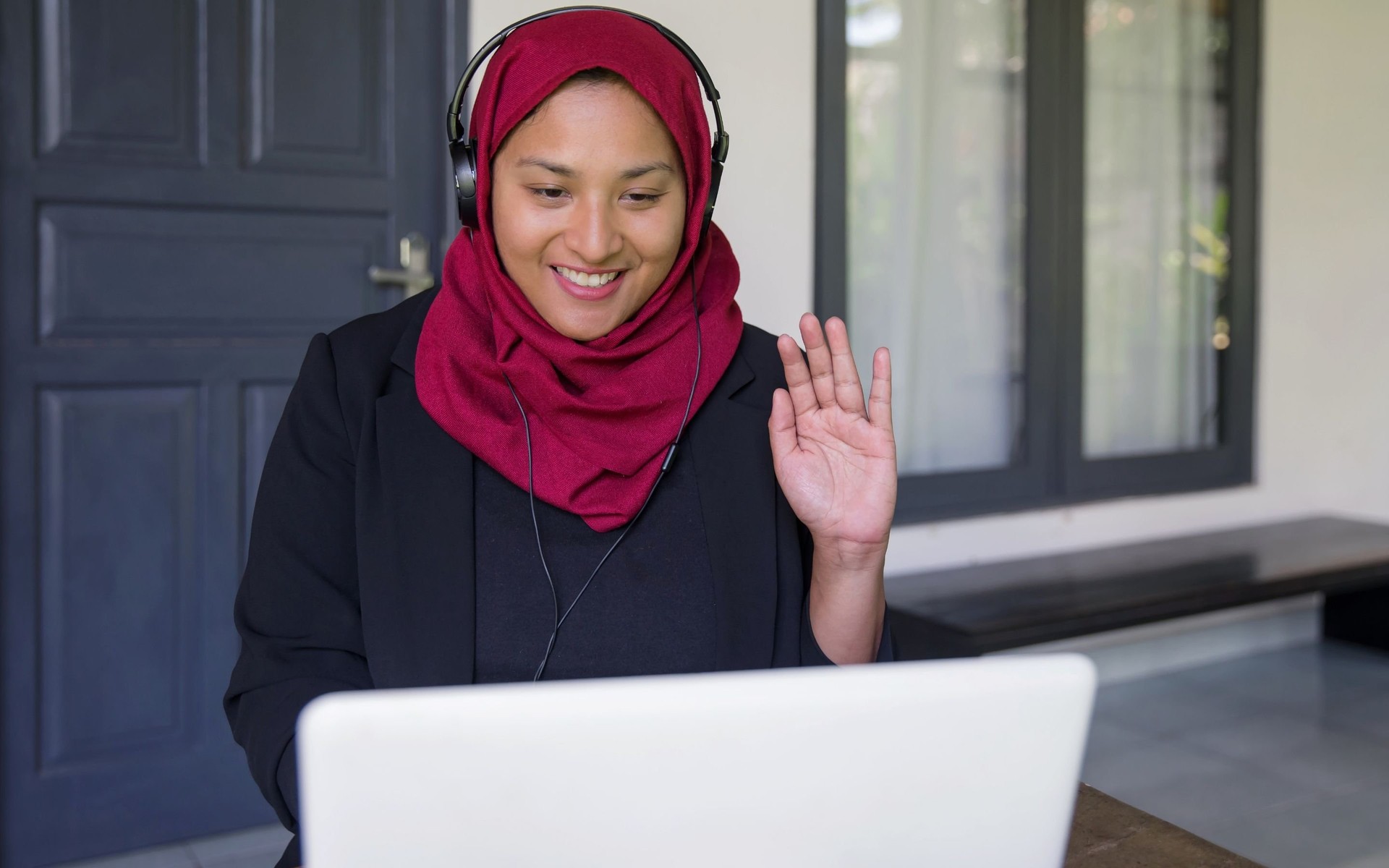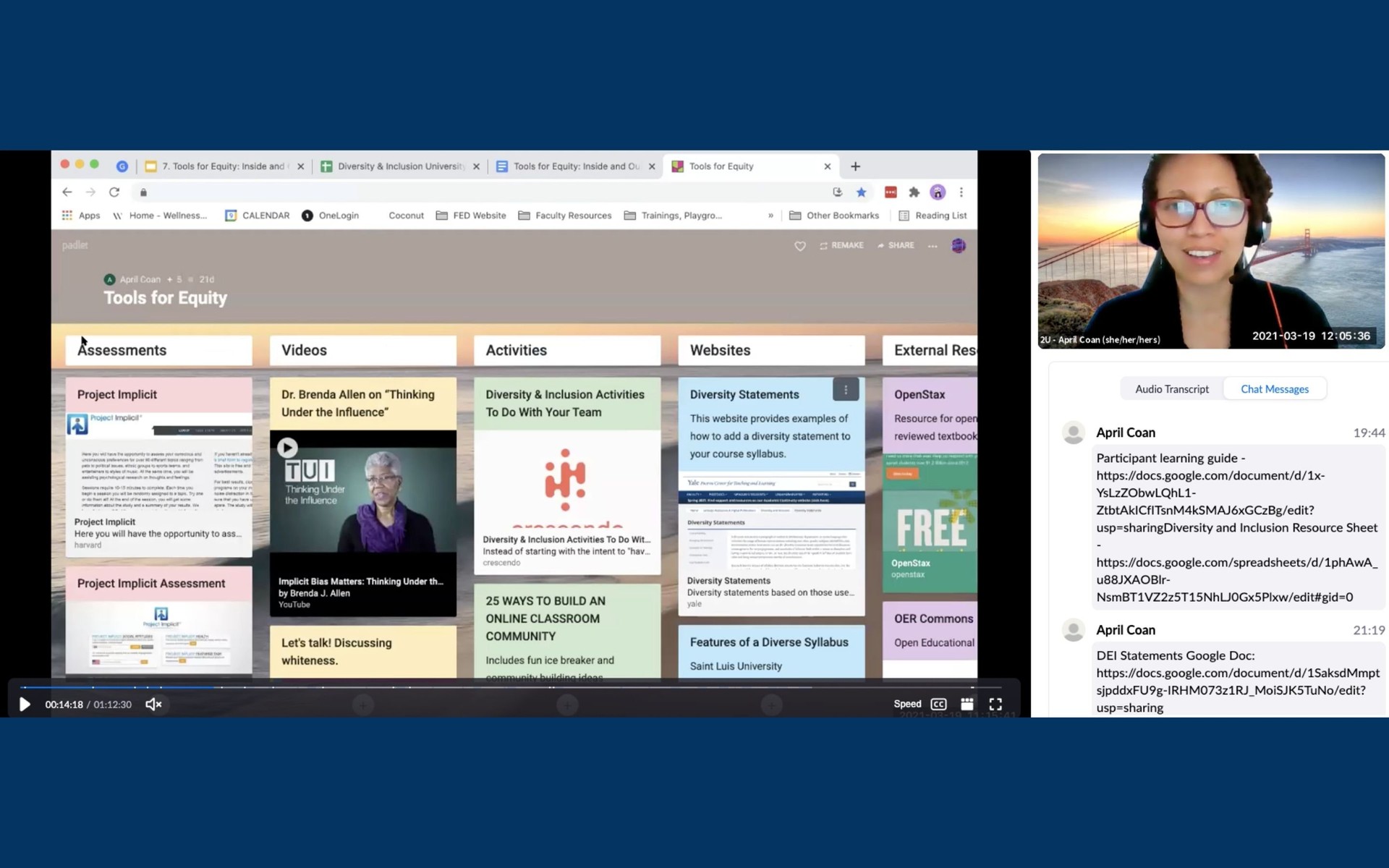Mission
Creating a Safe Space for Faculty to Build Their “Emotional Muscle” to Lead Classroom Conversations Around DEI
Written by Marylynne Viola-Lawson on Jul 14, 2021
Related content: Diversity And Inclusion

As the lead faculty trainer for enrichment at 2U, I keep my fingers on the pulse of what our university partner faculty say they need guidance on the most—and then my Faculty Success colleagues and I get to work. When I first joined the company, as a former Women’s and Gender Studies lecturer, I had always intended to create faculty seminars on diversity, equity, and inclusion (DEI) topics. Then last summer, when the deaths of George Floyd, Breonna Taylor, Ahmaud Arbery, Rayshard Brooks, and many others sparked national Black Lives Matter protests and a massive social justice movement, faculty from coast to coast expressed their needs loud and clear: They needed support in navigating discussions around DEI in the online classroom.
With advances in online education enabling people from anywhere in the world to enroll in 2U-powered programs, the growing diversity within digital learning environments is compelling more and more faculty to prioritize fostering ways to engage with students that are as respectful, supportive, and equitable as possible. But the approach to implementing these practices is not cut-and-dry.
To that end, my Faculty Success colleagues and I, in collaboration with 2U's Student Success and Content Development teams, developed and piloted an eight-week workshop series to help graduate degree faculty build their “emotional muscle” on the way to creating safe, inclusive, and brave spaces for hosting DEI-related conversations. We knew it was important to give faculty not only the structured training and resources they were asking for, but also their own safe space in which to interact with and learn from each other—and share real classroom scenarios they need help in understanding and overcoming. That’s how our online “Equity & Social Justice in the Digital Learning Environment'' workshops were born.
We knew it was important to give faculty not only the structured training and resources they were asking for, but also their own safe space in which to interact with and learn from each other.— Marylynne Viola-Lawson, Lead Faculty Trainer of Enrichment at 2U
Modelling Intimate and Supportive Spaces for Faculty to Share and Learn
To develop the curriculum for our first cohorts of the series, we conducted faculty and student focus groups, consulted a wide breadth of research from academia including resources from our university partners’ DEI centers, and relied on our own wealth of professional and personal experiences. The result was a robust curriculum created by a passionate group of 2U facilitators ranging from Ed.Ds and Ph.Ds to MBAs and JDs.
All of this planning and research helped us ensure that each week’s seminar session modelled how faculty members’ own online classroom discussions could be structured. Our collective effort, care, and empathy also helped ripen each week’s main topics for plenty of interaction and discovery: identity and intersectionality, bias and cultural competency, bystander intervention, and the “Three As” (allyship, activism, and accountability) among them. That last topic became particularly revealing when workshop interactions uncovered that faculty not only feared they weren’t equipped to host these conversations, but also that whatever they’d say or do in class would be “wrong.” Facilitators worked through the notion that we have to start somewhere, because the longer we go without activating these kinds of safe spaces for students, the more harm it is actually doing. Even small, step-by-step actions can help.
Along with adventures in theory, we know teachers also love practical, hands-on advice. So one of our most popular sessions in the Winter/Spring cohorts focused on “tools for equity”; i.e., how faculty can use Zoom, elements of the learning management system, small and large group interactions, personal reflection exercises, and a variety of written, visual, and collaborative materials to engage students in productive and equitable ways. Faculty were excited to have tangible resources they could take back to their online classrooms, implement, and then report back to the group how it went.

Serving a Critical Need and Making an Impact
The post-seminar responses we received from Winter/Spring cohort faculty participants—which ran the gamut from course designers and section instructors to department chairs and assistant deans—blew me away. Of those who completed our end-of-program survey, 94% rated the series “five out of five” in overall satisfaction, and 100% of them said they “strongly agreed” in recommending the series to a colleague. The stats were strong, but the personal feedback was even stronger:
- From an Emerson College faculty member: “This eight-week seminar was one of the most informative and transformational workshops I have ever attended. Difficult and crucial conversations were approached and initiated in a way that was accessible, respectful, and comfortable. I was not only encouraged to participate in these conversations, but given the tools to navigate, facilitate, and/or lead them in my classroom. I gained valuable insight and knowledge that will stick with me in my teaching and beyond.”
- From a University of South California faculty member: “I learned so much from theoretical concepts to practical application in my teaching, working, and being. I appreciated the culture that formed, and it inspired me to work even harder to create safe, brave spaces in my own online teaching. Thanks for the content, the experiences, and the role modeling!”
- From a Simmons University faculty member: “The series was a great place to meet colleagues across the country and reflect, learn best practices for DEI, and take an active role in anti-racist, inclusive teaching.”
- From a Pepperdine University faculty member: “The training provided a balance of theory, strategy, and open exchange that was invaluable to my equity journey.”
From Microaggression Management to Inclusive Rubrics to Cultural Humility
All of this faculty feedback gave us so much to work with as we plan our Equity & Social Justice seminars into the future. There’s a clear need for this guidance and support, and 2U is committed to making these workshops as informative and relevant as possible to prepare faculty to lead more equitable classroom experiences. For example, following more recent world events and specific faculty requests, the team has just launched new individual seminars on such topics as microaggressions, cultural humility, inclusive language, and accessibility accommodations. We’ve also focused topics on helping faculty construct inclusive classroom agreements, create unbiased rubrics, and support their online international students.
I’m excited to see these workshops continue to take shape and empower those on the front lines of higher education to open up safe spaces for courageous conversations. These seminars are a team effort, and I’m so proud of everyone who has worked on them so far.
~~~
Interested in learning more? Read our three-part series on The Latest on Creating a More Equitably Engaged Classroom. If you are degree program faculty with a 2U university partner, you can email FacultyEnrichment@2U.com for more information about upcoming Equity & Social Justice seminars.
Latest.
Learn more about us.
At 2U, we’re on a mission—to eliminate the back row in higher education and help universities thrive in the digital age. To learn more about who we are and what we do, follow the links below.